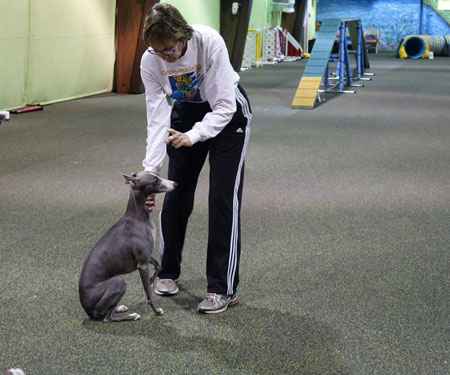Page 15 < previous page > <next page>
SOME HEALTH & SCIENCE NEWS
|
Jean Dodds: Small Breed Vaccine Study "An ongoing funded research study to assess the efficacy and duration of a half-dose canine distemper and canine parvovirus combined vaccine in small sized dogs, weighing less than 12 pounds as adults. The study is being undertaken by myself and holistic colleague, Dr. Richard Palmquist of Centinela Animal Hospital, Inc., and is funded by the American Holistic Veterinary Medical Foundation. Eligibility for the study requires that the small dog not have received any type of vaccine for at least 3 years, and be healthy; client informed consent is also required. The client’s regular veterinarian is a participant and must attest to the eligibility of the dog and draw the required blood samples. Blood samples to measure serum vaccine antibody titers are taken before, and 1 and 6 months after the dog receives the half dose of vaccine. We would like to enroll another 10-15 small dogs, so please tell your friends about the study. There is no charge to participate. Please visit http://bit.ly/1GfacYG to find out eligibility requirements and contact information for questions."
VIRUS AND VACCINE RELATED ARTICLES |
|
Notes on Dr. Richard Ford Seminar, by Patty Ewing
• There are over 100 canine vaccines on the market today. • Seeing lots of parvovirus outbreaks in Europe because the two most important vaccine windows are missed.....12-16 weeks and 1 yr. booster. Some Europeans finish vaccines at 8-10 weeks of age. • Some vaccine failures result from the vaccines being reconstituted too early...it should be reconstituted and drawn up in the syringe no more than 1 hour (2 hrs. at most) before administration - not hours before it is used. • Vaccine technology is undergoing unprecedented change. The recombinant distemper vaccine will induce antibody production 2 weeks earlier than standard vaccine for which maternal antibody interferes with antibody production. • Anecdotally, they are seeing genetic non-responders in Pit Bulls in addition to Rottweilers and Doberman Pinschers. A genetic non-responder will not develop protective antibodies no matter how many times you vaccinate or what vaccine you use. • Genetic non responders: 1 in 1000 dogs for parvo and 1 in 5000 for distemper. • Because lepto and Lyme are bacterial rather than viral diseases, you really need 2 vaccines given 2-4 weeks apart to get protective antibodies and revaccinate annually. If it has been 2 yrs. or longer since the vaccine was given, you need to administer 2 doses again, 2-4 weeks apart. • One dose of the oral or intranasal Bordetella will immunize, but you need 2 of the SQ vaccines 2-4 weeks apart to immunize. Immunity may last 12-14 months with intranasal or oral vaccine. • Should be using the 4-way lepto vaccine that includes the subspecies that we see in this area. The 2-way vaccine won't protect against the main one we see here. • Duration of immunity for Merial's 4 way lepto vaccine is 15.5 months. New England has highest incidence of lepto. It is seasonal...August through Dec, so the best time to vaccinate is summer. • Incidence of lepto has shifted from the rural farm dog to backyard dog. • Lyme disease has increased in humans from 30,000 to 300,000 cases per year in 10 years - now it is the #1 vector borne infectious disease in people in the US. • Lyme disease in dogs and people is spreading south and west from New England because migratory birds are spreading the ticks that carry the organism. Also in the mid-west and upper pacific coast now. • All dog Lyme vaccines share equal efficacy, according to this speaker. But they differ in adverse reactions. Recombinant vaccine less adverse reactions than killed whole spirochete vaccines. • This speaker recommends Lyme vaccine two doses 2-4 weeks apart to start, booster in 6 months, booster in 6 months again, then booster annually. Natural immunity is to OspC antibody which is unfortunately very short lived which is why susceptibility comes back quickly. Vaccine includes OspA...longer duration of immunity. • By the way, there is a rapid test for lepto coming soon. We sure need one. • The dog Bordetella bronchoseptica infects multiple species, including humans, so it is a zoonotic disease. There is currently a whooping cough outbreak in CA...same genus Bordetella, different species. • Intranasal and oral initial one dose Bordetella vaccine is effective in about 3 days. Best for outbreaks when you need immunity faster. • Intranasal Bordetella vaccine prevents shedding but the SQ vaccine does not. • Speaker mentioned that using SQ and oral or intranasal may provide the best long term protection. I have heard this before but have yet to see studies that have proved this. Maybe they are ongoing?. • Bordetella intranasal vaccine contains 20x the amount needed to induce immunity, so if they sneeze out a lot of it, which happens often, or if they struggle and you don't get it all in, it is usually not an issue. • If owner is immunocompromised, best to use the Bordetella SQ vaccine for their dog because SQ vaccine is killed and intranasal vaccine is live, replicates, and they can shed it. • Just remember that Bordetella is only one of several causes of kennel cough (also caused by corona, pneumovirus, Strep, Mycoplasma, PI, flu, ect.), and we only vaccinate for two of them...Bordetella and Parainfluenza. The more severe signs occur when multiple organisms are involved. • Killed vaccines cause more vaccine reactions like angioedema than modified live vaccines...more antigen...such as lepto and Lyme. You can pre-treat with a single dose of corticosteroids and not compromise the immune system response to vaccine, but most vets use Benadryl to pre-treat prior to vaccine administration and only corticosteroids to treat the angioedema if it develops. • Recommendations for dogs <= 20 lbs....delay non core vaccines until initial core series is finished to help prevent life threatening anaphylactic reactions. • The debate on whether or not vaccination causes immune mediated hemolytic anemia rages on. • Don't give the intranasal Bordetella vaccine SQ or you can cause a big abscess...ugly...I have seen this. • 60,000 people die of rabies each year worldwide. Source of 99% of human rabies deaths is dogs. Rabies is the only vaccine required by law. • 2013 in MA: 100 rabies positive animals, 2 cats and 97 wildlife, no dogs. • In MA, rabies vaccination is required by law for which species? Dog, cat, and ferret. • Who is authorized to administer rabies vaccine by law? Licensed vet only in MA; no vet techs. • Are you required to maintain a copy of the rabies vacc certificate in your MA clinic? Yes, for 4 years for all vaccines including rabies according to MA vet practice act. • What is the minimum age for rabies vacc? 12 weeks (nationally). Must be vaccinated by what age? 6 months in MA or 30 days within arriving in this state. Maternal antibody for rabies is pretty short...gone by 10 weeks of age at the latest. First lepto vaccine should not be given before 12 weeks of age (maternal antibody interferes before that age). • Pet is considered "currently vaccinated (immunized)" 30 days after the initial vaccination for rabies is given. If your dog is bitten by a rabid skunk 2 weeks after initial rabies vaccine, they are not considered to be currently vaccinated. • Dog bites person. In MA, what are the consequences for the pet and owner? Do not vaccinate the pet. Notify health director. Strict confinement ideally at your home for 10 days. Leash walking only when outside. If signs of rabies develop during confinement, the animal shall be euthanized....applies whether or not they are vaccinated. Contact state vet to be sure euthanasia is absolutely necessary. Vaccinate at end of 10 days if not current. • Can a 3 year labeled rabies vaccine be substituted for a 1 year labeled rabies vaccine by a vet in MA? Yes. This is not true in all states. • Rabies booster must be given not earlier than 9 months and not later than 12 months after the first rabies vaccine was given in order to booster with the 3 year vaccine. • Pet is 3 months overdue for rabies vaccine. For how long after becoming overdue can the pet still be considered protected? Answer: Not considered current if even one day overdue. • In MA, what is considered rabies exposure in a pet? 1) Pet is Scratched or bitten by a wild animal, 2) pet seen near or in the vicinity of a confirmed rabid animal, or 3) pet has a wound of unknown origin. The latter is the most misunderstood....really this should be a wound that looks like a bite wound from another animal, not just any type of wound. • Can a rabies antibody titer (from KSU's rabies lab) be used to establish immunity in a pet? No (can not be used as legal proof of immunity). Thanks, Patty!!! |


